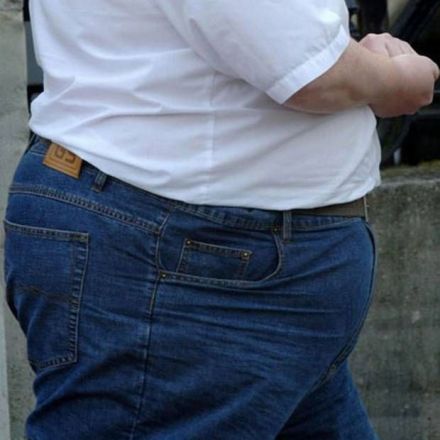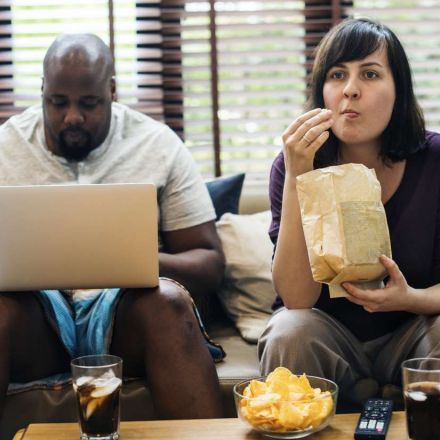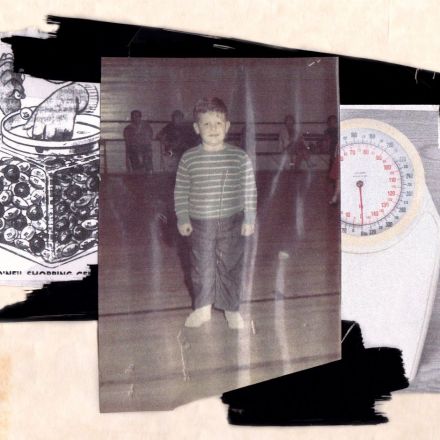

10 years ago
26
Obese men have just a '1 in 210' chance of attaining a healthy body weight
Obese men have only a one in 210 chance of attaining a healthy body weight, according to new research that suggests diet and exercise strategies are not effective in combating the obesity epidemic.
Continue Reading


























Join the Discussion
You can say that again. This article is straight up depressing for me. I even got hopeful about the mention of 30+ BMI being considered for surgery before remembering this was a UK newsite.
/t/keto - Seriously ate some of the most amazing and creative food. People couldn't believe me when I said "You eat fat to lose fat"
Unfortunately I'm under a required meal plan for my University so during the school year, I don't have access to healthy food. During the summer, I eat pretty healthy following the 17 Day Diet book. However, thanks for the link! I've been interested in cooking my own food (even if I can't at the moment) for a while and have a small collection of recipes I'm happy to add more to.
I'm not a health expert, but I've gone from 470 to today's weigh-in of 351.6lbs since last March. It's all calories-in-calories-out but I use keto to help keep energy and satiety where they need to be. If you have any questions, just let me know. It's actually really easy to get going, and then once you've got the mindset, it's hard to remember eating junk or going back to how things were.
This is exactly how I lost weight. I went from 102kg to 85kg in 4 months. I found an app that helped a lot. Mostly though it was the fact that it gave me my daily budget of calories I could spend and adjusted it if I did excercise. It also tood you the calories of something if you entered it. I wasn't told I couldn't eat anything, there were just certain things that I chose to stop eating because they were too "expensive".
It's a bit like when you decide you really want to buy a knew laptop, then you see how much it costs and decide it's not worth the amount you'd spend. I started realising that that awesome meal that I got from the recipe on the app, the meal that was too much food for me to finish, got less calories than this little chocolate I wanted.
I've also been doing keto and it works. I've lost weight and I have not gained it back. But I've also not gone back to the sad either.
http://www.dietdoctor.com/
This comment has been removed
Basically what /u/mathematical said. Keto isn't some "special" meals. Think Bacon, then add Bacon. Now give yourself a nice side of Bacon. Did I mention Bacon? I'm joking but not really. A sample of what I was eating:
Breakfast: 4 pieces of bacon and some scrambled eggs (with thickened cream instead of milk), and some halloumi (not necessary, more just to increase fat). Lunch / Dinner: Make things in bulk for dinner and freeze for the next day or twos lunch. We cooked a lot of chicken cordon bleu bake with broccoli or cauliflower and beens.
Oh a lot of red meat as well is good w/ fat.
Basically you're eliminating, breads, rice, anything with sugar and replacing with high fat. The easiest way to explain Keto is that you are reducing your carb intake as your body will break down carbs before fat. Increasing fat intake and lowering carbs will mean fat is burned faster.
It's an interesting lifestyle change. I went from 340 to 264 in 6 months. A lot of that (like 30-40 went within a few weeks due to water weight). You're not eating special, you're just eating smart. Also keep almonds handy and drink a lot of water when you are hungry. You'll get to a point where you'll be like.. meh eating, but you should keep your energy up so don't really ignore food.
Edit: Check out Caveman Keto for somewhat simple recipes.
The risk with findings like this is that people get despondent and think there is no hope
I think a lot of the problem with modern societies fatness is portion size, not knowing whats in their food, not being able to cook(or not trying)
I found a good way to lose weight which has no adverse impact on my health(unlike keto) and wellbeing. Weight comes off quickly, food is cheap & healthy, i know exactly what's in it and i don't have to spend too much time cooking
I'm down from 162Kg to 149Kg in 2 months and still going, loads of energy, clearer mind, good food and more confidence
I beg to differ, of course diet and exercise strategies are key to attaining and maintaining a healthy weight. The only way a person will lose weight is if they take in less calories than needed. Not many people know how to cook appropriately too and will make/buy too big or too rich meals out of habit. More often people fall back to their old habits when things are beginning to look well (like those shitty tabloid 7-day diets, in the end they changed nothing), they need therapy to drop those instead of surgery.
If you can't drop (basically any) bad habits, please look into getting behavioral therapy.
I think one has to ask a lot of questions before you can find the salient questions...diet and exercise do work, it's basic thermodynamics at play. How can individuals keep themselves motivated to stay on a regimen of fewer calories and more activity in a western world of perpetual plenty and sedentary work?
We weren't this fat earlier...even as recently as the 1970's, obese people were rare. According to http://lanekenworthy.net/2012/05/31/why-the-surge-in-obesity/ the most likely culprit isn't TV or the internet or more sedentary work, it's increased caloric consumption. Think of the 64oz Big Gulp at 7-11. 744 calories for a (non-diet) coca-cola at that size! And portion sizes keep going up in restaurants and grocery stores, given that even if its just 30 cents or a dollar to upsize a fast food meal, the added food in the portion costs much less than this, boosting profits on the sale. It's certainly in the immediate interest of businesses to maximize the wealth of their shareholders by boosting the profits of each sale. Consumers want a bargain. Both producers and consumers will resist any attempt by a government to regulate the portion size of food as an unwelcome intrusion of their freedom. Yet it will be the government and the health care system that will bear the external cost of their own populations slowly digging their own graves one fork-full at a time.
An effective solution that can be implemented into the society we have right now seems impossible for me to imagine.
Portion sizes are definitely a big deal. I battled with weight for a long time because I never really changed portion sizes, just how many meals I ate (would go from 180 to 250 pounds back and forth because of crash dieting and then crash eating). Only recently did I actually change the portion sizes of my meals, and have already lost around 30 pounds in 4 months. Not a super fast diet by any means, but a lot easier to keep the weight off because once you get used to the portion sizes, you don't really have a way to go back up in weight unless you suddenly start eating 4-5 meals a day.
I guess the only problem I have with this article is the use of BMI as a healthy weight. For anyone 6'2" and over, a "healthy weight" BMI is basically a "skinnyfat" person who is not remotely fit. Many of us big guys have HUGE leg muscles (I can full-motion leg press 1000lbs). Those aren't going away because I continue to work them out as I lose weight. If I get down to 240, which for my broadness and massive legs is pretty skinny, I'd still be overweight and almost into obese land. To get into "healthy", I'd need to get down to 204lbs. With my frame and all the muscle in my arms and legs, that's not even possible. I would have to lose about half the muscle in my legs to even get near there.
Basically, BMI is a poor metric for tall people, and as depending on the average height of their test group, it could skew results. I wonder what the numbers look like of people coming from "obese" into "overweight" on the BMI scale, as that might be more indicative of people becoming a "healthy weight".
BTW, weight loss surgery is ridiculous at a BMI of 30. I was at a BMI of 57.2 when I started eating right and exercising and one year later I'm at 42.8. Also, instead of having health issues like those who have surgery, I'm in the best health of my life. Seriously, if anyone is considering weight loss surgery, talk to someone who has been successful in weight loss without any fad/extreme diets. Most of us love helping people. :)
BMI is terrible for individual analysis, it does work tho in large populational measurement.
I think it's decent for a rule of thumb. If you're far outside the norm you already know that, but if you're average it gives you a ballpark idea of where you are.
Honestly, the "BMI isn't a good metric" crowd seems to be used mostly by people who are unhealthy but want to justify being overweight, not people who actually fall into the rare exceptions.
I don't think that's right at all. It's possible to gain/have weight that isn't purely fat and still be within the healthy range of the BMI. I'm over 6'2" and within the healthy BMI range and am pretty fit, definitely not "skinnyfat" at least. I think BMI is a pretty good guideline, but there are obviously some exceptions and you can be in good shape with a BMI over 25, or in bad shape with a BMI between 18.5 and 24.9, depending on the person.
Cut down on sugar and carbs and become skinnier, pretty simple, lost almost 40 lbs in less than 6 months! KETO FTW!!
/t/keto fist bump
That was literally the first tribe I checked when I migrated over from Reddit.
This is only going to get more problematic as jobs by and large shift away from manual labor in industrialized countries while junk food availability continues to increase. Not sure there's an easy way around it, seeing as how there appears to be a shortage of willpower these days.
Let's say that your eating habits mean you're likely to put on 5 kg (about 11 lbs) of weight a year. That's about 100kcals a day overage on average. Drinking one less can of soda or 40 minutes of walking a day would combat that, but it's hard for people to be aware of it. Tracking consumption certainly helps, but my experience is that most people don't want to put up with doing that. I think that's part of the "30 minutes of Cardio three times a week" comes in, because that's a little more intensive but easier to track with about the same net impact.
I recently watched Fed Up and it shows some of the reasons for this kind of behavior. Many companies are profiting from this and the average person is quickly entering the vicious cycle of weight gain and loss. The people need to be better informed and the government needs to better regulate the food industry.
MRW reading this article... http://i.imgur.com/pb27baO.jpg
Well, shit.